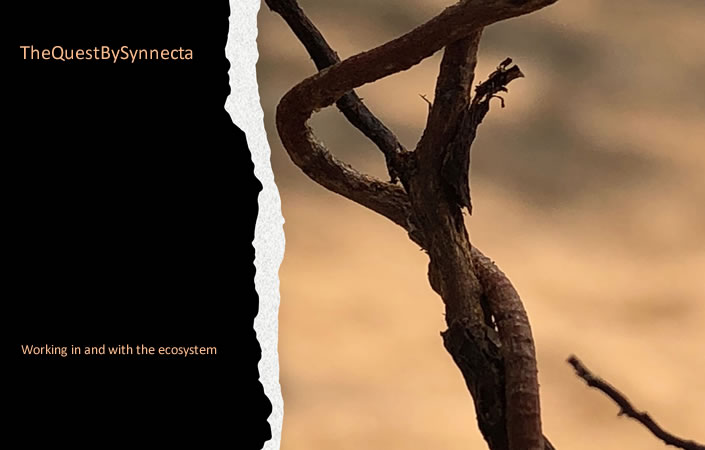TheQuestBySynnecta – What are we for?

People in organizations expect a credible answer to this question in order to be able to establish a context for their work that delivers a sense of both purpose and meaning. Reacting to such challenges, companies position themselves with a company purpose. Until now, this purpose has almost always been developed from an inside viewpoint. However, organizations always exist in the context of an ecosystem. A meaningful purpose can only be developed in dialogue with the stakeholders of the company‘s own ecosystem. At SYNNECTA, we endeavour to give a truly multi-perspective design to these dialogue processes and thereby foster a deeper understanding of the company’s identity.
People need to work in meaningful contexts
The mindsets of societies change and shift in ways that are especially tangible to the younger generations. There is a growing desire and need for meaningful work contexts and an intention to contribute something useful for a greater whole while working. In short: living meaningfulness.
At the same time, societies are asking companies what contribution they are making to people and society. It is a question that both citizens and employees want answered.
Reacting to such challenges, companies position themselves with a company purpose. However, this purpose is still often strongly driven by a marketing outlook. The company purpose is therefore worked out within the old structures: A selected group of managers formulates a purpose that is then communicated inwards and outwards with considerable effort.
A range of perspectives – those that have developed out of the highly diverse employee population, from the clients, sectors of society and the markets – are hardly represented. So far, there has been a lack of real and open dialogue between the interest groups. A shared understanding to provide a basis for a company purpose cannot be developed this way.
Understanding our own identity in the context of the ecosystem: »What are we for?«
Organizations evolve and exist in the context of various stakeholders: markets, clients, competition, partners, society, employees, etc. All of these systems are in continuous exchange and yield an influence on each other. Together, they make up an ecosystem. Since organizations are always part of an ecosystem, they can only arrive at an understanding of their own role within the context of that ecosystem. The identity of an organization is defined through a constant exchange with the ecosystem.
Developing an organization’s identity that can provide meaning and a sense of community must therefore focus on asking:
- What are we for? What is our contribution to our ecosystem?
Any answer to this question that is found only from within the organization will establish a limited and frequently distorted perspective. It is based on hypotheses about the self and the world that were developed along many paths, but never in exchange with that very world, the stakeholders in the own ecosystem.
A true understanding of the own identity requires direct dialogue with the various stakeholders that make up the own ecosystem. It needs to come from a perspective that goes from the outside in:
- What do you need?
- What can we do for you?
- What can we do together?
- How should we be from your point of view, what makes us attractive partners to you?
Dialogue and joint examination of the own ecosystem
We create shared dialogue spaces with the stakeholders of the ecosystem and therefore make it possible to create a joint, multi-perspective debate to achieve a common and shared guiding theme. All relevant viewpoints will find a place where they can learn from and with each other: about themselves, about joint interests, about shared potential. This process then underlies a grasp of the own identity and the own purpose. This guided dialogue allows synergies to emerge. The multi-perspective process expands everyone’s thinking. The processes of creation and implementation come together and establish a high degree of commitment for the joint cause.
Our Approach:
- The organization chooses an overall guiding theme for the dialogue in the ecosystem.
- A suitably wide spectrum of various stakeholders is invited to join in and explore this guiding theme together.
- Shared, relevant questions that pertain to the guiding theme are developed together with the stakeholders.
- Further guiding questions will support the moderation of a substantial and demanding dialogue that is fundamentally set out to take in many perspectives.
- Promising impulses from the dialogue can be adopted and can kick off future initiatives and joint projects.
- The stakeholders can develop further individual conclusions and measures from the shared insights.
The choice of stakeholders is essential to the success of the process. A successful dialogue fosters new insights and therefore needs to start from a sufficient degree of difference. It requires constructive juxtaposition. Here lay the great challenges and the opportunities of multi-perspective dialogue processes: allow differences, let them have an effect and develop deeper, shared insights together with them.
